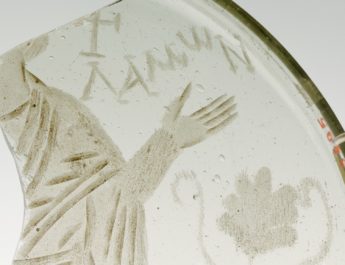1 Timothy 1:12-17
Ordinary C42
12 I amA gratefulB to ChristC JesusD our Lord,E
A “am” = echo. This is to have, hold, possess.
B “grateful” = charis. From chairo (to rejoice, be glad; used to say hello; properly, delighting in the grace of God or experiencing God’s favor); from char– (to extend favor, lean towards, be inclined to be favorable towards). This is grace, kindness, favor, gratitude, thanks. It is the sense of being inclined to or favorable towards – leaning towards someone to share some good or benefit. This can be literal, figurative, or spiritual. It is grace as abstract concept, manner, or action.
C “Christ” = Christos. From chrio (consecrate by anointing with oil; often done for prophets, priests, or kings). Literally, the anointed one, Christ. The Greek word for Messiah.
D “Jesus” = Iesous. From Hebrew Yehoshua (Joshua, the Lord is salvation); {from YHVH (proper name of the God of Israel; the self-existent and eternal one); {from havah (to become) or from hayah (to come to pass, become, be)} + yasha (to deliver, defend, help, preserve, rescue; properly, to be open, wide or free, which implies being safe. So, in a causative sense, this is to free someone)}. This is Jesus or Joshua in Greek – the Lord saves or the Lord is salvation.
E “Lord” = Kurios. From kuros (authority, supremacy). This is a respectful address meaning master or sir. It refers to one who has control or power greater than one’s own. So, it was also applied to God and Jesus as Master or Lord.
who has strengthenedF me, because he consideredG me faithfulH and appointedI me to his service,J
F “strengthened” = endunamoo. 7x in NT. From en (in, on, at, by, with) + dunamoo (to empower, strengthen, enable); {from dunamis (might, strength, physical power, efficacy, energy, and miraculous power; force literally or figuratively – the power of a miracle or the miracle itself). This is to give someone power or ability, to grow or make strong, make able.
G “considered” = hegeomai. From ago (lead, bring, carry, drive, guide, go). This is to think, suppose, have an opinion. It is to lead the way, what comes in front or first, initial thought, high esteem or authority. It can refer to one who commands in an official capacity. This word shares a root with the word “hegemony.”
H “faithful” = pistos. From peitho (to have confidence, urge, be persuaded, agree, assure, believe, have confidence, trust). This is faithful, trustworthy, reliable, sure, or true. It is a fullness of faith. This is the same root as the word “faith” in Greek.
I “appointed” = tithemi. This is to put, place, set, fix, establish in a literal or figurative sense. Properly, it is placing something in a passive or horizontal position.
J “service” = diakonia. Perhaps from dia (through, across to the other side, thoroughly) + konis (dust) OR from dioko (to chase after, put to flight; by implication, to persecute or to purse like a hunter after its prey; this can be earnestly pursue or zealously persecute) {related to dio (put to flight)}. This is service, ministry, attending someone, service. It can mean serving someone at a table or otherwise as their servant/slave. It is also used for people who serve/minister in temples, as well as the work of Christian ministry. Figuratively, this word can mean money given for charity. This shares a root with “deacon” and is where the word “diaconate” comes from.
13 even though I was formerlyK a blasphemer,L a persecutor,M and a man of violence.N
K “formerly” = proteron. 11x in NT. From proteros (before, first, previously); from pro (before, ahead, earlier than, above). This is formerly, before.
L “blasphemer” = blasphemos. 4x in NT. From blapto (to harm or to hinder) + pheme (saying, news, rumor, fame) {from phemi (to say, declare, speak comparatively through contrasts, bring to light); from phao (to shine)}. This is blasphemer, reviler, reviling; speaking slander or evil.
M “persecutor” = dioktes. Related to “service” in v12. 1x in NT. From dioko (see note J above). This is one who pursues or persecutes.
N “man of violence” = hubristes. 2x in NT. From hubrizo (to insult, mistreat, steal; figuratively, to harm someone so that they experience a loss, particularly to their reputation or honor; violence or abuse). This is one who finds joy in mistreating or harming others. It can also be someone who is insolent or violent. The harm can be to someone’s reputation or physical harm. It shares a root with the word “hubris.”
But I received mercyO because I had actedP ignorantlyQ in unbelief,R
O “received mercy” = eleeo. From eleos (mercy, pity, tender mercy, or compassion; generally understood in action by word or deed). This is to have pity on, show mercy to, be compassionate; often used for God’s grace. When we sing or say “kyrie eleison” (Lord, have mercy), it is from this root verb.
P “acted” = poieo. This is to make, do, act, construct, abide, or cause.
Q “ignorantly” = agnoeo. From a (not) + noieo (to perceive, think, understand); {from nous (mind, understanding, reasoning faculty, intellect, capacity to reflect); from noos (mind); probably from the base as ginosko (to know, recognize, realize, perceive, learn; gaining knowledge through personal experience)}. This is unaware not to know. Sometimes it is willful ignorance, but other times it is simply not knowing.
R “unbelief” = apistia. Related to “faithful” in v12. 11x in NT. From apistos (unbelieving, incredulous, faithless; someone who rejects faith); {from a (not, without) + pistos (see note H above)}. This is unfaithfulness, distrust, disbelief, disobedience.
14 and the graceS of our Lord overflowedT for me with the faithU and loveV that are in Christ Jesus.
S “grace” = charis. Same as “grateful” in v12. See note B above.
T “overflowed” = huperpleonazo. 1x in NT. From huper (by, under, over, above, under the authority of another) + pleonazo (to abound, increase, to superabound); {from pleion (many, more, great, having a greater value, more excellent); from polus (much, many, abundant)}. This is to be numerous or superabundant. Hence, it can be to overflow.
U “faith” = pistis. Related to “faithful” in v12 & “unbelief” in v13. From peitho (see note H above). This is less about knowing, believing, and repeating a list of doctrines then it is about trusting God. Faith means listening to God and seeking to live a holy life even (and especially) when we don’t understand how everything works or fits together. Faith is about being faithful (trusting and doing) rather than being all knowing.
V “love” = agape. From agapao (to love, take pleasure in, esteem; to prefer). This is love, goodwill, benevolence. It is God’s divine love or human love that mirrors God’s love.
15 The sayingW is sureX and worthyY of fullZ acceptance:AA
W “saying” = logos. From lego (to speak, tell, mention). This is word, statement, speech, analogy. It is a word that carries an idea or expresses a thought, a saying. It could refer to a person with a message or reasoning laid out in words. By implication, this could be a topic, line of reasoning, or a motive. It can be used for a divine utterance or as Word – Christ.
X “sure” = pistos. Same as “faithful” in v12. See note H above.
Y “worthy” = axios. Related to “considered” in v12. From ago (see note G above). This is related to weight or worth – deserving, suitable, corresponding, due reward.
Z “full” = pas. This is all or every.
AA “acceptance” = apodoche. 2x in NT – both in 1 Timothy. From apodechomai (to welcome, embrace, receive, approve of; to show hospitality); {from apo (from, away from) + dechomai (to warmly receive, be ready for what is offered, take, accept, or welcome; to receive in a literal or figurative sense).}. This is acceptance or approval. It is as the welcoming of guests applied to affirmation.
that Christ Jesus cameBB into the worldCC to saveDD sinnersEE—of whom I am the foremost.FF
BB “came” = erchomai. This is to come or go.
CC “world” = kosmos. Perhaps from the base of komizo (to carry, convey, recover); from komeo (to take care of). This is order, the world, the universe, including its inhabitants. Literally, this is something that is ordered so it can refer to all creation. It can also refer to decoration in the sense that something is better ordered and, thus, made more beautiful. This is where “cosmos” and “cosmetics” come from.
DD “save” = sozo. From sos (safe, rescued, well). This is to save, heal, preserve, or rescue. Properly, this is taking someone from danger to safety. It can be delivering or protecting literally or figuratively. This is the root that “savior” and “salvation” come from in Greek.
EE “sinners” = hamartolos. From hamartano (to miss the mark, do wrong, make a mistake, sin); {from a (not) + meros (a part or share)}. This is sinning, sinful, sinner. It referred to missing the mark or falling short. The term was also used in archery for missing the target.
FF “foremost” = protos. From pro (before, first, in front of, earlier). This is what is first, which could be the most important, the first in order, the main one, the chief.
16 But for that very reason I received mercy, so that in me, as the foremost, Jesus Christ might displayGG the utmostHH patienceII as an exampleJJ
GG “might display” = endeiknumi. 11x in NT. From en (in, on, at, by, with, among) + deiknumi (to show, point out, exhibit; figurative for teach, demonstrate, make known). This is to prove, demonstrate, show by word or deed.
HH “utmost” = hapas. Related to “full” in v15. From hama (at once, together with) + pas (all, every, every kind of) OR from a (with) + pas (see note Z above). This is all; every part working together as a unit.
II “patience” = makrothumia. 14x in NT. From makros (long, long lasting) {from mekos (length); probably related to megas (great or large)} + thumos (passion, wrath; actions emerging from passion or impulse) {from thuo (to rush along, breathe violently, offer sacrifice)}. Properly, this is long-passion or long-suffering – one who waits the needed amount of time before expressing anger. This is also patience, perseverance, and fortitude.
JJ “example” = hupotuposis. 2x in NT – in 1 & 2 Timothy. From hupotupoo (to delineate); {from hupo (by, under, about, subordinate to) + a derivative of tupos (a figure, model, image, impression, pattern, copy; a model created through much repetition; figuratively, the proper model; the impression of a stamped image, the mark of a scar, the shape of a statue; figuratively, a style or resemblance; specially, a model as something to imitate or as a cautionary tale); {from tupto (to strike repeatedly, wound, punish; figuratively to offend)}}. This is an example, standard, sketch, imitation, prototype.
to those who would comeKK to believeLL in him for eternalMM life.NN
KK “come” = mello. Perhaps from melo (something that one is worried or concerned about, something one pays attention to or thinks about). Properly, this is ready, about to happen, to intend, delay, or linger. This is just on the point of acting.
LL “believe” = pisteuo. Related to “faithful” in v12 & “unbelief” in v13 & “faith” in v14. From pistis (see note U above). This is to believe, entrust, have faith it, affirm, have confidence in. This is less to do with a series of beliefs or doctrines that one believes and more to do with faithfulness, loyalty, and fidelity. It is trusting and then acting based on that trust.
MM “eternal” = aionion. From aion (an age, length of time); from the same as aei (ever, always, unceasingly, perpetually; on every occasion). This is agelong, unending, forever.
NN “life” = zoe. From zao (to live, be alive). This is life including the vitality of humans, plants, and animals – it is life physical and spiritual and life everlasting.
17 To the KingOO of the ages,PP immortal,QQ invisible,RR the onlySS God,TT
OO “King” = Basileus. Probably from basis (step, hence foot; a pace); from baino (to walk, to go). This is king, emperor, or sovereign.
PP “ages” = aion. Related to “eternal” in v16. See note MM above.
QQ “immortal” = aphthartos. 8x in NT. From a (not, without) + phtheiro (to destroy, corrupt, ruin, deteriorate, wither; also used of moral corruption); from phthio (perish, waste away). This is imperishable, undecaying, immortal, incorruptible.
RR “invisible” = aoratos. 5x in NT. From a (not, without) + horatos (this is visible, something that one can see); {from horao (to see, perceive, attend to, look upon, experience; to stare at, which implies clear discernment; by extension, attending to what was seen and learned; to see, often with a metaphorical sense, which can include inward spiritual seeing)}. This is something that one cannot see – something invisible. Figuratively, it could refer to the reality of the divine.
SS “only” = monos. Perhaps from meno (to stay, abide, wait, endure). This is alone, single, remaining, mere, desolate.
TT “God” = Theos. From Proto-Indo-European origins, meaning do, put, place. This is God or a god in general.
be honorUU and gloryVV forever and ever.WW Amen.XX
UU “honor” = time. From tino (to pay, be punished, pay a penalty or fine because of a crime); from tio (to pay respect, value). This has to do with worth or something’s perceived value. Literally, it means price, but figuratively, it means the honor or value one sees in someone or something else. It can be esteem or dignity. It can also mean precious or valuables.
VV “glory” = doxa. From dokeo (to have an opinion, seem, appear, suppose; a personal judgment; to think); from dokos (opinion). This is literally something that evokes a good opinion – something that connects to our understanding of intrinsic worth. The ultimate expression of this is, of course, God and God’s manifestation. So, this is opinion, honor, and dignity, but also praise, glory, renown, and worship.
WW “forever and ever” = eis + ho + aion + ho + aion. Literally, “to the ages of the ages.” Aion is the same as “ages” in v17. See note PP above.
XX “amen” = amen. From Hebrew amen (verily, truly, amen, truth, so be it, faithfulness); from aman (to believe, endure, fulfill, confirm, support, be faithful, put one’s trust in, be steadfast. Figuratively, this is to be firm, steadfast, or faithful, trusting, believing, being permanent, morally solid). This word is literally firmness, but figuratively fidelity, faithfulness, honesty, responsibility, trust, truth, steadfastness. Properly, it is to be sure, certain, or firm. This is a word of emphasis indicating that something crucial follows.
Image credit: “Gaudi Jesus” by Jason, 2005.




